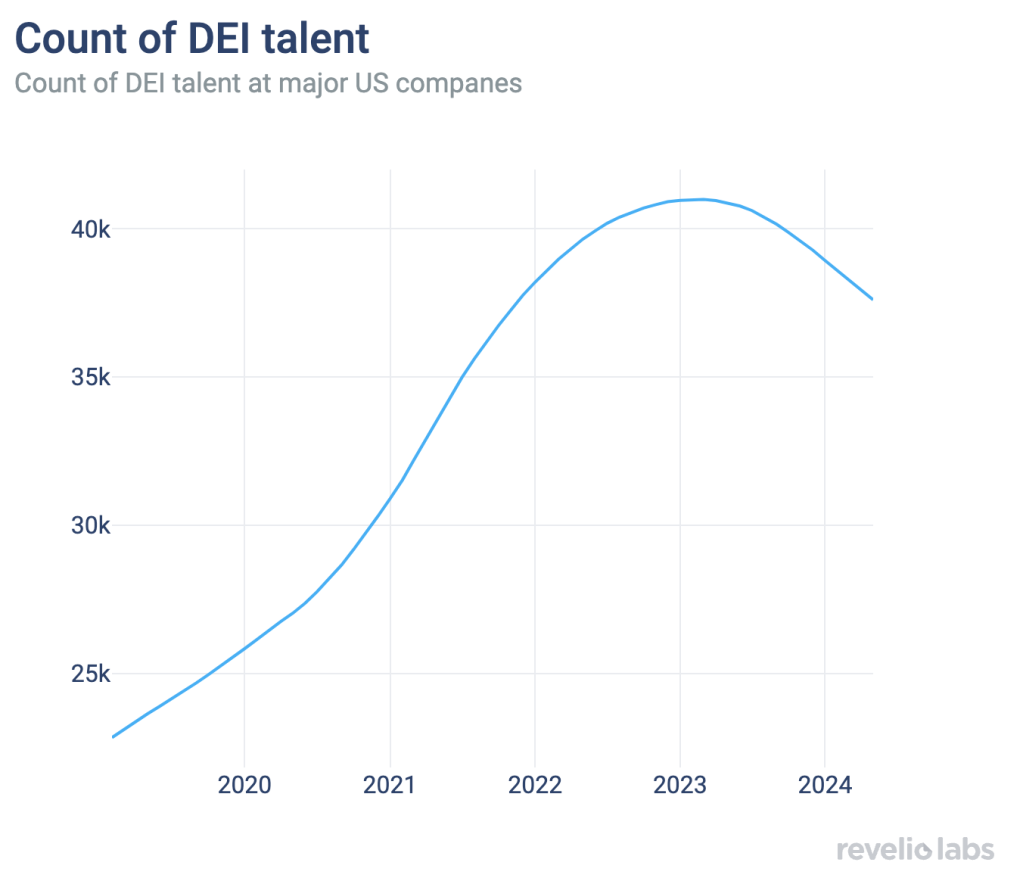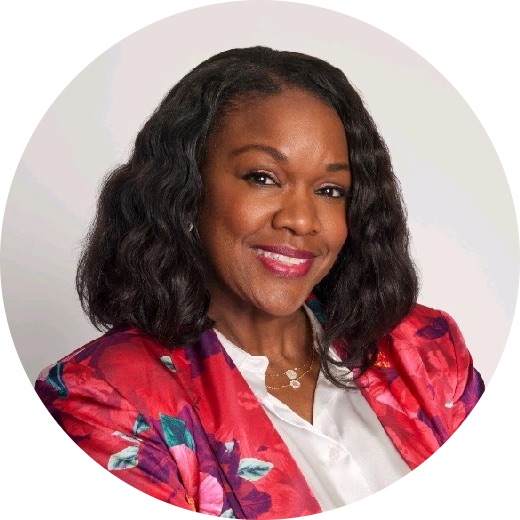By the numbers: the state of corporate DEI programs

Here are some important statistics to consider:
- Almost 40% of executives agree that backlash against diversity, equity and inclusion programs has increased since the Supreme Court ruled that race-based admissions programs are illegal about a year ago – Littler.
- Headcount in DEI roles is down 10% from its peak in early 2023 – internal Revelio Labs shared with WorkLife.
- More than a third of business executives said their organizations are facing uncertainty regarding how to move ahead with their DEI programming in a legally compliant way in the wake of increased challenges to corporate diversity programs – Littler.
- More than two dozen public companies mentioned DEI as a risk factor in their earnings reports in the first quarter of this year – Bloomberg.
- One in three executives said their organizations do not have clear plans and goals in place relating to DEI – Littler.
- Yet nearly 60% executives say their organizations have increased their DEI commitment and level of activity to some degree since 2022 – Littler.
- Only 6% of executives said their organizations had decreased their DEI commitment and level of activity in 2023 – Littler.
_________________________________________________________________________________________
Corporations took major public stances on racial equity following the murder of George Floyd in May 2020 and the social justice movement it triggered, and subsequently boosted their diversity hiring and other DEI initiatives. But last year’s reversal of affirmative action has the pendulum swinging in another direction.
“We’re seeing a trend of more companies folding to the social pressure to eliminate their DEI programs,” said Ro Pilla, president of Aquent Talent, a global staffing firm.
Major employers like Zoom have cut entire DEI-focused teams while others have or are considering scaling back their DEI programs. New legal risks and the threat of reverse discrimination lawsuits are a new concern. And HR leaders in particular are in a tricky spot as they try to navigate shifting viewpoints and in some cases changes to programs they’ve been responsible for.
Even the Society of Human Resource Management is reexamining its own messaging on DEI. Last week in a LinkedIn post the organization said it was dropping “equity” from its DEI acronym, changing it to just IE.
The decision was made based on a variety of factors, said SHRM president and CEO Johnny C. Taylor, Jr. To start, SHRM has conducted a variety of surveys with employers and staff to gauge responses to DEI programs, and found the word equity caused more confusion than diversity and inclusion. And ultimately, if organizations have diversity and inclusion, they should also be fostering equity.
“The full definition of inclusion must encompass equity, because fairness, equity, decency, civility and belonging are inherently virtues of inclusivity,” he said.
“Mind you all of us are practicing HR, no one has figured it out,” he added.
“By emphasizing Inclusion-first, we aim to address the current shortcomings of DE&I programs, which have led to societal backlash and increasing polarization,” the SHRM post said.
Individual HR leaders dealing with these shifts are “working to ensure that they continue to kind of future proof and understand the activities of the organization, to ensure that they’re going to just withstand any scrutiny that might come,” Jolen Anderson, chief people and community officer at performance management platform BetterUp.
Over the past few years employers have prioritized enhancing their DEI initiatives, “going beyond just ensuring racial and gender diversity, but also addressing neurodiversity, sexual orientation diversity, religion, veteran status and a lot more,” Pilla said.
Cutting programs entirely is a dangerous trend, and instead employers should take this opportunity to recalibrate their current DEI programs, Pilla said. “So much of the employee experience is lost when they’re fully eliminating the programs that I don’t think that people are fully realizing.”
DEI isn’t just about social good, it’s good for business too, she stressed. “Diverse teams bring a wider range of perspectives and experiences to the table. This leads to more creative solutions, better decision making, a stronger understanding of customers,” she said.
One growing concern driving employers to reexamine DEI initiatives is new legal risks, and the threat of reverse discrimination lawsuits. In those cases, workers who are typically white and male claim they have been discriminated against or denied opportunities by way of their employers’ efforts to hire and promote more people from underrepresented groups.
Some high-profile business figures like Elon Musk and Alexandr Wang, cofounder and CEO of Scale AI, have spoken out against DEI programs in favor of what they call “MEI” — which stands for merit, excellence and intelligence.
In a blog post, Wang wrote “we only hire the best person for the job, we seek out and demand excellence, and we unapologetically prefer people who are very smart. We treat everyone as an individual. We do not unfairly stereotype, tokenize, or otherwise treat anyone as a member of a demographic group rather than an individual.”
But other workplace experts say DEI programs are imperative to operational success. Such programs boost belonging, and employees who feel a strong sense of belonging experience a 56% increase in job performance and 50% reduction in turnover risk compared to those who don’t, according to a survey from BetterUp including responses from over 1,700 full-time U.S. workers.
“This should be seen as a business-initiated initiative. This is not a social nicety, it’s a business necessity to get the best talent engaged to do the best work,” said Stephen Paskoff, former EEOC attorney and current CEO of human capital consulting firm Employment Learning Innovations. “Are you going to encounter risks? Yes, every business encounters risks,” he said.
Even with all the confusion and changes, there’s still some hope for the future of these programs. Pilla at Aquent said demand for a diversity hiring tool it offers has increased year over year and she expects it to continue “so that does show me that it is still a priority for a number of companies out there, and that does give me hope that the pendulum will not swing so far back,” she said.
And data from Revelio labs shows while hiring for DEI roles is on the decline, DEI headcount still remains far above where it was just four years ago.

“Regardless of what acronyms might be in vogue or how we’re adjusting letters, HR practitioners have to remain steadfast in their commitment to building companies where all employees are embraced and given opportunities to grow,” Anderson said.



